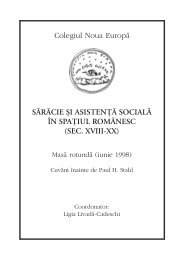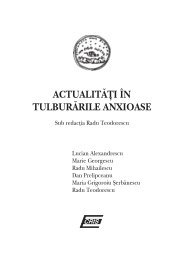New Europe College Regional Program Yearbook 2001-2002
New Europe College Regional Program Yearbook 2001-2002
New Europe College Regional Program Yearbook 2001-2002
Create successful ePaper yourself
Turn your PDF publications into a flip-book with our unique Google optimized e-Paper software.
N.E.C. <strong>Yearbook</strong> <strong>2001</strong>-<strong>2002</strong><br />
27 It is only in her recent book that Alexandra Laignel-Lavastine sheds more<br />
light on the wartime activity of two of the most famous pro-Legionary<br />
intellectuals, Mircea Eliade and Emil Cioran. See LAIGNEL-LAVASTNE,<br />
Alexandra, Cioran, Eliade, Ionesco : L’oubli du fascisme, PUF, Paris, <strong>2002</strong>,<br />
pp. 275-382. The book immediately provoked acute debate among the<br />
Romanian public. Although some of her statements are too extreme and rely<br />
very much on presuppositions, the information she gives, in particular with<br />
regard to the wartime activity of Mircea Eliade, is of particular interest as she<br />
uses his important Portuguese diary, which was unknown to the public at<br />
large as it was only published in Spanish, in 1941.<br />
28 Eliade arrived in Lisbon on 10 February 1941, the day of the break-up of the<br />
British-Romanian diplomatic relations and was to stay in Portugal until<br />
September 1945, when he left for Paris.<br />
29 Mihail Sebastian was one of the best Jewish writers in Romania at that time.<br />
He was a disciple of Nae Ionescu and many of the representatives of the<br />
“young generation” who in the late 1930s became sympathizers or adherents<br />
to the Iron Guard. In his diary, Sebastian wrote with sorrow about Mircea<br />
Eliade’s “Guardist conversion”, whom he considered one of his closest<br />
friends, and the change in their relationship. See, SEBASTIAN, Mihail, Jurnal.<br />
p. 41, 45, 85-6, 96, 120, 148, 157.<br />
30 See, SEBASTIAN, Mihail, Jurnal., pp. 231-32.<br />
31 See, ELIADE, Mircea, Autobiography, vol.II : 1937 – 1960. Exile’s Odyssey,<br />
The University of Chicago Press, Chicago, 1988, p. 4.<br />
32 The same view is also expressed by Laignel-Lavastine in her recent book<br />
(already mentioned) on Cioran, Eliade and Ionesco.<br />
33 This was actually Eliade’s last visit to his motherland. The reasons for this<br />
“coming back” exactly at that time are quite unclear. Eliade mentions in his<br />
memoirs that this visit was connected with information he had received<br />
from one of his friends in Bucharest that he was listed among the candidates<br />
for the chair of Philosophy of Culture, recently created at the University. See,<br />
ELIADE, M. Autobiography, vol.II : 1937 – 1960, p. 98. It is more believable,<br />
however, that it was more in connection with Eliade’s recent visit to the<br />
Portuguese dictator Salazar and the message he had to deliver to general<br />
Antonescu, ibid., pp. 99-100.<br />
34 ORNEA, Zigu, Anii treizeci. Extrema dreaptã româneasca, Editura Fundaþiei<br />
Culturale Române, Bucureºti, 1996, p. 197.<br />
35 The text of this speech was later published in the Transylvanian newspaper,<br />
Glasul strãmoºesc (Sibiu), nr. 10, 25 decembrie 1940. LAIGNEL-LAVASTINE<br />
, A. Cioran, Eliade, Ionesco, p. 132.<br />
36 SEBASTIAN, M., Jurnal, 286.<br />
37 In her last book Alexandra Laignel-Lavastine confirms the disputed fact that<br />
for a short time Cioran really occupied the position of cultural advisor at the<br />
Romanian Embassy in Vichy. See, LAIGNEL-LAVASTNE, A. Cioran, Eliade,<br />
Ionesco, p. 530.<br />
134







